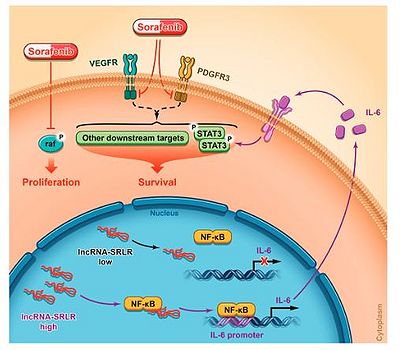Difference between revisions of "LNCSRLR"
Jiabao Cao (talk | contribs) (→Expression) |
Jiabao Cao (talk | contribs) (→Function) |
||
| Line 11: | Line 11: | ||
===Function=== | ===Function=== | ||
| − | + | [[File:LncRNA-SRLR-fun.JPG|right|thumb|400px|'''Schematic diagram of lncRNA-SRLR-based regulatory mechanism in RCC cells'''<ref name="ref1" />.]] | |
| − | |||
LncRNA-SRLR knockdown sensitizes nonresponsive RCC cells to sorafenib treatment, whereas the overexpression of lncRNA-SRLR confers sorafenib resistance to responsive RCC cells. Mechanistically, lncRNA-SRLR directly binds to NF-κB and promotes IL-6 transcription, leading to the activation of STAT3 and the development of sorafenib tolerance. A STAT3 inhibitor and IL-6-receptor antagonist both restore the response to sorafenib treatment. Moreover, a clinical investigation demonstrates that high levels of lncRNA-SRLR correlates with poor responses to sorafenib therapy in RCC patients.<ref name="ref1" /> | LncRNA-SRLR knockdown sensitizes nonresponsive RCC cells to sorafenib treatment, whereas the overexpression of lncRNA-SRLR confers sorafenib resistance to responsive RCC cells. Mechanistically, lncRNA-SRLR directly binds to NF-κB and promotes IL-6 transcription, leading to the activation of STAT3 and the development of sorafenib tolerance. A STAT3 inhibitor and IL-6-receptor antagonist both restore the response to sorafenib treatment. Moreover, a clinical investigation demonstrates that high levels of lncRNA-SRLR correlates with poor responses to sorafenib therapy in RCC patients.<ref name="ref1" /> | ||
Latest revision as of 07:01, 7 November 2017
Contents
Annotated Information
Name
LNCSRLR:lncRNA sorafenib resistance in renal cell carcinoma associated
lncRNA-SRLR[1]
Characteristics
LncRNA-SRLR is located on chromosome 3 in humans and is composed of 2 exons with a poly (A) tail and has a full length of 663 nt, as determined via a rapid amplification of cDNA ends assay.[1]
Cellular Localization
The subcellular distribution assay reveals that lncRNA-SRLR is predominately located in the nucleus.[1]
Function

LncRNA-SRLR knockdown sensitizes nonresponsive RCC cells to sorafenib treatment, whereas the overexpression of lncRNA-SRLR confers sorafenib resistance to responsive RCC cells. Mechanistically, lncRNA-SRLR directly binds to NF-κB and promotes IL-6 transcription, leading to the activation of STAT3 and the development of sorafenib tolerance. A STAT3 inhibitor and IL-6-receptor antagonist both restore the response to sorafenib treatment. Moreover, a clinical investigation demonstrates that high levels of lncRNA-SRLR correlates with poor responses to sorafenib therapy in RCC patients.[1]
Expression

LncRNA-SRLR is preferentially upregulated in RCCs(Renal cell carcinoma) with inherent sorafenib resistance.[1]
Diseases
Renal cell carcinoma[1]
Labs working on this lncRNA
- Department of Urology, Changzheng Hospital, Second Military Medical University, Shanghai, China.